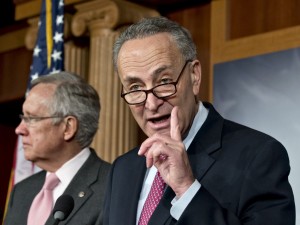New ‘fiscal cliff’ GOP revives failed budget talks
 Republicans once again try to revive budget talks with the administration by proposing a $2.2 trillion ‘fiscal cliff’ offer in the House of Representatives. The Republican proposal from House Speaker John Boehner of Ohio counters the $1.6 trillion plan supported by the White House.
Republicans once again try to revive budget talks with the administration by proposing a $2.2 trillion ‘fiscal cliff’ offer in the House of Representatives. The Republican proposal from House Speaker John Boehner of Ohio counters the $1.6 trillion plan supported by the White House.
The White House had earlier proposed higher federal tax rates for the next decade, higher national debt limits, and possible extension of Social Security payroll tax cuts.
While the White House plan pushes for higher federal tax rates on the wealthy, the Republican version of the ‘fiscal cliff’ plan relies on curbing government and social service spending in order to avoid the ‘fiscal cliff’ and raise federal tax revenues in the next decade.
The ‘fiscal cliff’ is a term used to refer to the combined effects of the expiration of Bush federal tax cuts by the end of December, the beginning of across-the-board spending cuts in January, the beginning of federal taxes related to President Obama’s healthcare policies, and the failure of the Congress and the administration to agree upon a budget deal in 2011.
The new GOP echoes the main ideas from the failed budget talks with the president in 2011. However, Obama and the Democrats are now more bent on imposing higher federal tax rates on the wealthy and less willing to agree on budget cuts on benefit programs such as Medicare after re-election.
With ‘fiscal cliff’ nearing, Boehner and six other House Republicans state that their priority is to find a plan that can be “signed into law in the next couple of weeks.”

